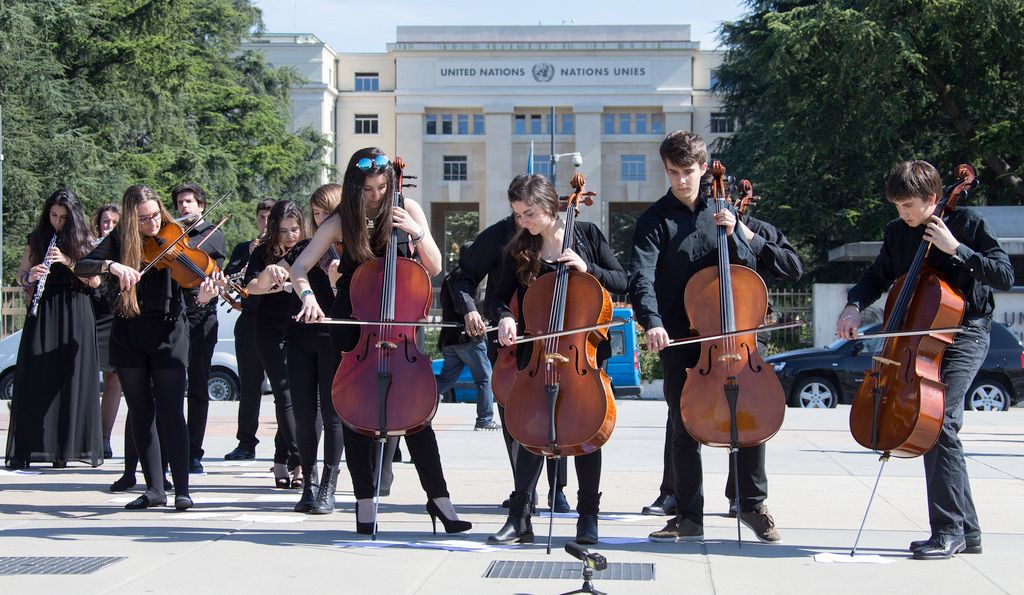| The Trumpeter Once a renowned orchestra lost its first trumpet player and needed to find a new one. Many had loved the last trumpeter. He had gotten along well with the rest of the orchestra and mentored the younger members. The other horn players urged him to stay, but he said it was time to move on to other things. Some had not liked him at all and they told the orchestra directors that they must find a different trumpet player, one who was the best in the world and would shine. The directors found several contenders and signed them up to audition. One player, a large man with conductor hair, held a press conference before his audition. “I will be selected,” he boasted. “There is no question about it. I am the best trumpeter in the land. The others are mere amateurs. One just spits into his horn and the other is a woman. A woman playing trumpet? Outrageous!” After his audition, he held a rally of his supporters. “Thank you, thank you,” he shouted, waving at his fans. “Fantastic!” The trumpeter continued to hold rallies while waiting for the decision. The woman who auditioned also held rallies. Each had their supporters and each thought they would win. Using crude language, the big trumpeter kept repeating his assertion that women couldn’t play trumpets. The other contenders held their peace. They knew the contest would be between these two. Finally, the day of decision came. The woman trumpeter was sure she would win. After all, it was time that a woman join the brass section. Imagine her surprise and disappointment when the large male trumpeter won instead. Two months later, the symphony season began. There, in first chair, sat the new trumpet player with his special gold trumpet. “Gold trumps brass,” he said. The other players treated him with respect but they were not real friendly. “Call me DT,” he told them. “Unless you want to call me “Lord Trumpet.” He laughed then he pushed his chair into the one next to him, “I need more room. And my own music stand. I can’t share a stand.” They didn’t answer so he went to find the director. The symphony director brought another stand and told the other players to move closer to the edge of the stage. They did so reluctantly. The concert went fairly well, although the first trumpet played too loudly, drowning out the clarinets. “I am a soloist,” he said disdainfully when the others reproached him after the concert. “I play to be heard. And the audience loves it. Just look at how they applauded me at the end.” The others shrugged. What could they do? They couldn’t deny that he played the trumpet well. And it was true that many in the audience had wildly applauded. But it was just as true that many of the old patrons had complained to the management about the botched concert. “The worst they had ever heard” they said. The symphony season progressed. To showcase their newest member, the maestro planned a series of concerts focussed on the trumpet. In one, DT had a difficult solo. He pulled it off and all applauded. The press, however, panned the rest of the concert. “While the solo was splendid,” one reporter wrote, “the rest of the concert was a disaster. All that could be heard was the gold trumpet, drowning out all the other voices in the orchestra.” DT answered with a press release of his own. “Fake news. They are just jealous that they can’t play the trumpet. What do they know about music? Hacks.” The next concert featured the brass section but had no solos. The trumpet again overpowered the other horns. Then, during a quiet interlude featuring the woodwinds, the audience was startled by a short “squawk.” The conductor paled and looked wildly around, but he soon recovered and kept on conducting. The orchestra kept playing. Then came another squawk and a few minutes later, another. The orchestra gamely kept playing to the end. After the concert, the conductor turned angrily to the orchestra. “Okay,” he shouted. “Who is the idiot who kept squawking?” The orchestra members looked at each other. They knew none would confess to such a transgression. But imagine their surprise when DT raised his hand and said proudly, “Those were my tweets. I thought the flute section sounded weak, so I added some tweets of my own.” The conductor was furious. He wanted to throw the trumpeter out immediately. But the symphony had a contract that said a member could not be thrown out without due process. So the conductor had no choice but to allow DT to continue. The symphony season continued apace. At each concert, DT pulled off some trick to bring attention to himself. He was unrepentant when the other orchestra members pleaded with him nor did he care when the conductor threatened him. The conductor began to schedule pieces that had no trumpet part, but that didn’t stop the lead trumpet. He would show up anyway to “support” the woodwind section with his tweets. The press took to laughing at him now and the television shows satirized him hilariously. He ranted at the press and the shows but did not stop his antics. The audience dwindled as well. Now only a few people showed up, mainly to laugh and taunt the musicians. They always applauded the trumpeter loudly, shouting “Bravo” whenever he tried a trick and chanting “DT, DT” at the end of the concert. DT would send out a press release, boasting of the large, appreciative audience. When the press countered with a photo of a few people in the symphony hall, DT answered, “Fake photo. We all know about photoshop.There were hundreds, even thousands of people there. All the seats were full and there were people standing on stage even. True fact.” “What can we do,” the other musicians asked each other? “Our orchestra will be ruined.” Finally, one day the symphony board announced that they were holding new auditions for the trumpet section. “I am first trumpet,” DT announced. “You cannot hold auditions for my position. Hold them for second trumpet if you wish.” The symphony president held out a sheet of paper. “Check out your contract,” she said. “It hires you for a term of four years. Those four years are over next month.” “But it says I’ll be rehired if I do well,” the trumpeter answered confidently. “I play well, you can’t deny that.” “Do well means many things,” the president answered. “Among others, getting along with the other musicians and above all, producing harmony in the orchestra. The orchestra is no place for musicians who hold forth on their own. If you want to be in the limelight, become a maestro. Right now, you are one of many, hired to create a harmonious whole.” “But I don’t want to be one of many.” “Then leave.” “Fine,” said DT in a huff. “I’ll leave. And you’ll see. I’ll be the best trumpeter in the land. All will come to listen to me and no one will come to hear the symphony. My tweets are famous.” “Indeed, they are,” the president answered. “We wish you well with your tweets. Meanwhile, we will find another trumpet player who understands what it means to play as part of the whole.” That month, the symphony held new auditions and finally picked a woman who had become well known and well liked in her city. She had a regular brass trumpet that she played quite proficiently. But she did not like solos. So the conductor scheduled symphonic pieces that featured the brass occasionally but without fanfare. The orchestra regained its audience and found favor with the press. One person, however, did not like the new trumpet player. During his solo concerts, held in his own gilt-decorated hotel, DT would tweet a bit then would stand up to give a speech midconcert. His favorite one was, “Can you believe that brassy woman? She can’t even play a decent solo. Everyone knows that women can’t play the trumpet. Sad.” And the few people in the audience would laugh and taunt, “Ha, ha, yeah, women are so weak.” The symphony musicians just smiled to themselves and kept playing their music. -MW | Better Possibility Every truth falls short of truth And all views in part are biased. This we know but little heed. Truth and views have always been Mankind's guiding absolutes, The cause of endless human turmoil. If humans are to become more civil, And nations less belligerent, We need but pause and change our ways. We need only to take to heart That every truth falls short of truth, That all views in part are biased, Then say and do accordingly. The Human Condition Reason is a light that shows the way, Emotions are the thrust that knows no bounds. Humans are caught betwixt and between. Ideality's common pleasant fantasy, Reality's everyman's daily challenge. Humans are caught betwixt and between. Peace is a love that knows no assertion, War is a passion beyond satiation. Humans are caught betwixt and between. Humanity is a beautiful dream, Inhumanity is an ugly reality. Humans are caught betwixt and between. Love makes family and community possible, Hate inflames and tears apart. Humans are caught betwixt and between. Good deeds are lauded but rarely practiced, Bad deeds are reviled but freely perpetuated, Humans are caught betwixt and between. Every pull has opposing push, There's no end to life's dilemmas. We are damned if we do and damned if we don't. Humans are caught betwixt and between, Perplexed, confused, rent and spent! Love and Music For German Romantics of yore, Love and music were wed. Liebe spricht in Tönen, Denn Gedanken sind zu fern. This meld of love and music Finds ready expression in English. Music is love's language, For thought is too remote. -JM Pithy Wisdom from JM Success trumps ethics. Barkers are many, biters are few. Empathy is a friendly bridge, antipathy is a hostile ridge. Music is the panacea of panaceas. Píccola has her say: Just rub my tummy and all will be well with the world. |
|
2 Comments
|
Archives
February 2024
|

